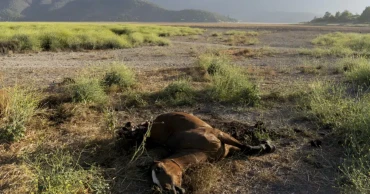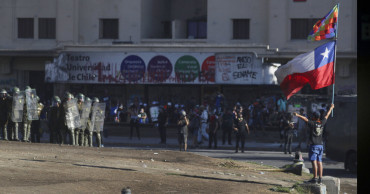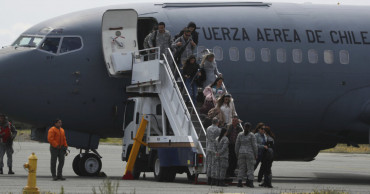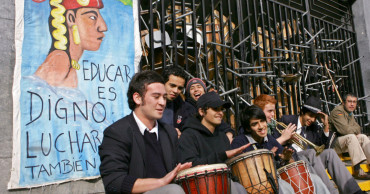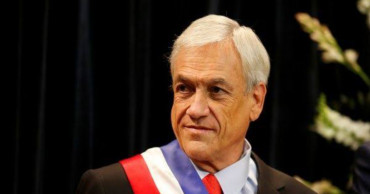Chile
Experts found Chilean poet Neruda was poisoned, nephew says
Forensic experts have determined that Chilean poet Pablo Neruda died of poisoning nearly 50 years ago, a family member of the Nobel Prize winner said Monday.
The revelation by Rodolfo Reyes, a Neruda nephew, is the latest turn in one of the great debates of post-coup Chile. The long-stated official position has been that Neruda died of complications from prostate cancer, but the poet's driver argued for decades that he was poisoned.
There was no confirmation of Reyes' comments from forensic experts from Canada, Denmark and Chile who are scheduled to publicly release a report Wednesday on the cause of Neruda's death.
The public release of the group's finding has been delayed twice this year, first due to internet connectivity issues of one of the experts and then again because a judge said the panel had yet to reach a consensus.
International forensics experts several years ago rejected the official cause of death as cachexia, or weakness and wasting of the body due to chronic illness — in this case cancer. But at that time they said they had not determined what did kill Neruda.
In an interview with The Associated Press, Reyes said forensic tests carried out in Danish and Canadian labs indicated a presence of “a great quantity of Cloristridium botulinum, which is incompatible with human life.” The powerful toxin can cause paralysis in the nervous system and death.
Reyes first revealed the information to the Spanish news agency EFE earlier Monday.
As a lawyer in the judicial case over his uncle’s death, Reyes said he has access to the forensic report, which was carried out after the same group of experts said in 2017 that there were indications of a toxin in the late poet’s bones and a molar.
The lab tests concluded that the toxin was administered when the poet was alive, Reyes said.
The report is set to be released almost 50 years after the death of the poet and Communist Party member and 12 years after the start of a judicial investigation into whether he was poisoned, as his driver Manuel Araya maintains.
Araya told AP earlier this month he was confident that the forensic findings would support his assertion the poet died after being given “an injection in the stomach” at the clinic where he was hospitalized. Araya said he first heard that version of events from a nurse.
Neruda, who was 69 and suffering from prostate cancer, died in the chaos that followed Chile’s Sept. 11, 1973, coup that overthrew President Salvador Allende and put Gen. Augusto Pinochet in power.
Neruda’s body was exhumed in 2013 to determine the cause of his death but those tests showed no toxic agents or poisons in his bone. His family and driver demanded further investigation.
In 2015, Chile’s government said it was “highly probable that a third party” was responsible for Neruda's death. Neruda was reburied in his favorite home overlooking the Pacific Coast last year.
In 2017, a team of international scientists determined that Neruda did not die of cancer or malnutrition, rejecting the official cause of death but not saying what he did die of.
“The fundamental conclusions are the invalidity of the death certificate when it comes to cachexia as a cause of death,” Aurelio Luna, one of the panel’s experts, said at that time. “We still can’t exclude nor affirm the natural or violent cause of Pablo Neruda’s death.”
Neruda, who was best known for his love poems, was a friend of Allende, who killed himself rather than surrender to troops during the coup led by Pinochet.
Neruda was traumatized by the military takeover and the persecution and killing of his friends. He planned to go into exile, where he would have been an influential voice against the dictatorship.
But a day before his planned departure, he was taken by ambulance to a clinic in Chile's capital of Santiago where he had been treated for cancer and other ailments. Neruda officially died there Sept. 23, 1973, from natural causes.
But suspicions that the dictatorship had a hand in the death remained long after Chile returned to democracy in 1990.
The former Mexican ambassador to Chile at the time of the bloody military coup, Gonzalo Martínez Corbalá, told AP on two occasions that he saw Neruda the day before his death and that his body weight was close to 100 kilos (220 pounds). Martínez spoke to AP by phone in 2017, a few days before his death.
Araya told AP last month he still thinks that if Neruda “hadn’t been left alone in the clinic, they wouldn’t have killed him.”
He recalled that on Neruda’s instructions, on Sunday, Sept. 23, the poet’s wife, Matilde Urrutia, and he were at the mansion to pick up the suitcases that would be taken to Mexico the following day. In the middle of the afternoon Neruda asked them to come back quickly. He died that same night.
During his life, Neruda accumulated dozens of prizes, including the 1971 Nobel Prize for Literature, but in recent years criticism has appeared from feminist groups over a rape he committed in the 1930s and which he recounted in his book “I Confess That I Have Lived.” He also is criticized for abandoning his only daughter, Malva Marina, because she was born with hydrocephalus
3 years ago
13 dead in Chile amid struggle to contain raging wildfires
At least 13 people were reported dead as of Friday night as a result of the more than 150 wildfires burning across Chile that have destroyed homes and thousands of acres of forest while the South American country is in the midst of a scorching heat wave.
Four of the deaths involved two separate vehicles in the Biobío region, around 560 kilometers (348 miles) south of the capital of Santiago.
“In one case they were burned because they were hit by the fire,” Interior Minister Carolina Tohá said. In the other case, she said, the victims died in a crash, “probably trying to escape the fire.”
The fifth victim was a firefighter who was run over by a fire truck while combatting a blaze in the area.
Later in the afternoon, a helicopter that was helping combat the flames crashed in the Araucanía region, killing the pilot, a Bolivian national, and a mechanic, who was Chilean.
At nightfall, the national agency responsible for emergencies raised the death toll to 13 without giving details on the latest deaths.
As of midday Friday, 151 wildfires were burning throughout Chile, including 65 declared under control. The fires had blazed through more than 14,000 hectares (34,595 acres).
Most of the wildfires are in Biobío and neighboring Ñuble, where the government has declared states of catastrophe that allows greater coordination with the military and the suspension of certain constitutional rights.
The heat wave hitting Chile is set to continue with high temperatures and strong winds that could make the wildfires more challenging.
President Gabriel Boric suspended his vacation to travel to the affected areas on Friday and said there is “evidence” that some of the wildfires were sparked by unauthorized burnings.
“The full force of the state will be deployed to, first of all, fight the fires and to accompany all the victims,” Boric said.
It remained unclear how many homes and other structures had been burned.
“Families are having a very difficult time,” Ivonne Rivas, the mayor of Tomé in Biobío, told local radio. “It’s hell what they are living through, the fire got away from us.”
The wildfires caused the suspension of a highly anticipated announcement by forensic experts who were expected to give the cause of death of Chilean poet Pablo Neruda, winner of a Nobel Prize for literature.
The experts were set to give their view on whether Neruda died of complications from prostate cancer or whether he was poisoned, potentially settling one of the great mysteries of post-coup Chile.
The doctor in charge of delivering the report’s findings was unable to connect to the internet because he is in a region affected by the wildfires, a spokesman for the country’s judiciary said.
3 years ago
Bangladesh ambassador presents credentials to Chilean president
Bangladesh Ambassador Sadia Faizunnesa has presented her credentials to Chilean president Gabriel Boric Font at Palacio de La Moneda in Chile's capital Santiago.
Sadia assumed the charge of ambassador of Bangladesh to Brazil on October 17, 2021. She will also serve as Bangladesh's non-resident ambassador to Chile and Bolivia.
Following the presentation of her credentials Friday, the Bangladesh ambassador had a meeting with Gabriel Boric.
Sadia spoke about the friendship between legendary Latin American leader Fidel Castro and Bangladesh's Father of the Nation Bangabandhu Sheikh Mujibur Rahman.
Boric said he was touched when he learned what Fidel Castro said about Bangabandhu in 1973: "I have not seen the Himalayas. But I have seen Sheikh Mujib. In personality and in courage, this man is the Himalayas. I have thus had the experience of witnessing the Himalayas."
The Chilean president lauded the rapid, unprecedented socio-economic progress of Bangladesh, calling the country a role model for developing countries.
Boric also gladly accepted the invitation to visit Bangladesh.
Read more: New Zealand's new envoy presents his credentials to President Hamid
3 years ago
Leftist millennial wins election as Chile’s next president
A leftist millennial who rose to prominence during anti-government protests was elected Chile’s next president Sunday after a bruising campaign against a free-market firebrand likened to Donald Trump.
With 56% of the votes, Gabriel Boric handily defeated by more than 10 points lawmaker José Antonio Kast, who tried unsuccessfully to scare voters that his inexperienced opponent would become a puppet of his allies in Chile’s Communist Party and upend the country’s vaunted record as Latin America’s most stable, advanced economy.
In a model of democratic civility that broke from the polarizing rhetoric of the campaign, Kast immediately conceded defeat, tweeting a photo of himself on the phone congratulating his opponent on his “grand triumph.” He then later traveled personally to Boric’s campaign headquarters to meet with his rival.
Meanwhile, outgoing President Sebastian Pinera — a conservative billionaire — held a video conference with Boric to offer his government’s full support during the three month transition.
Amid a crush of supporters, Boric vaulted atop a metal barricade to reach the stage where he initiated in the indigenous Mapuche language a rousing victory speech to thousands of mostly young supporters.
Read: Islamic world pitches ways to aid desperately poor Afghans
The bearded, bespectacled president-elect highlighted the progressive positions that launched his improbable campaign, including a promise to fight climate change by blocking a proposed mining project in what is the world’s largest copper producing nation.
He also promised to end Chile’s private pension system — the hallmark of the neoliberal economic model imposed by the dictatorship of Gen. Augusto Pinochet.
“We are a generation that emerged in public life demanding our rights be respected as rights and not treated like consumer goods or a business,” Boric said. “We know there continues to be justice for the rich, and justice for the poor, and we no longer will permit that the poor keep paying the price of Chile’s inequality.”
He also gave an extended shout out to Chilean women, a key voting bloc who feared that a Kast victory would roll back years of steady gains, promising they will be “protagonists” in a government that will seek to “leave behind once and for all the patriarchal inheritance of our society.”
In Santiago’s subway, where a fare hike in 2019 triggered a wave of nationwide protests that exposed the shortcomings of Chile’s free market model, young supporters of Boric, some of them waving flags emblazoned with the candidate’s name, jumped and shouted in unison as they headed downtown to join thousands who gathered for the president-elect’s victory speech.
“This is a historic day,” said Boris Soto, a teacher. “We’ve defeated not only fascism, and the right wing, but also fear.”
At 35, Boric will become Chile’s youngest modern president when he takes office in March and only the second millennial to lead in Latin America, after El Salvador’s Nayib Bukele. Only one other head of state, Giacomo Simoncini of the city-state San Marino in Europe, is younger.
His government is likely to be closely watched throughout Latin America, where Chile has long been a harbinger of regional trends.
It was the first country in Latin America to break with the U.S. dominance during the Cold War and pursue socialism with the election of Salvador Allende in 1970. It then reversed course a few years later when Pinochet’s coup ushered in a period of right-wing military rule that quickly launched a free market experiment throughout the region.
Read: Cuba begins vaccinating children as young as 2
Boric’s ambitious goal is to introduce a European-style social democracy that would expand economic and political rights to attack nagging inequality without veering toward the authoritarianism embraced by so much of the left in Latin America, from Cuba to Venezuela.
It’s a task made more challenging by deepening ideological divisions unleashed by the coronavirus pandemic, which sped up the reversal of a decade of economic gains.
Kast, who has a history of defending Chile’s past military dictatorship, finished ahead of Boric by two points in the first round of voting last month but failed to secure a majority of votes. That set up a head-to-head runoff against Boric.
Boric was able to reverse the difference by a larger margin than pre-election opinion polls forecast by expanding beyond his base in the capital, Santiago, and attracting voters in rural areas who don’t side with political extremes. For example, in the northern region of Antofagasta, where he finished third in the first round of voting, he trounced Kast by almost 20 points.
An additional 1.2 million Chileans cast ballots Sunday compared to the first round, raising turnout to nearly 56%, the highest since voting stopped being mandatory in 2012.
“It’s impossible not to be impressed by the historic turnout, the willingness of Kast to concede and congratulate his opponent even before final results were in, and the generous words of President Pinera,” said Cynthia Arnson, head of the Latin America program at the Wilson Center in Washington. “Chilean democracy won today, for sure.”
Kast, 55, a devout Roman Catholic and father of nine, emerged from the far right fringe after having won less than 8% of the vote in 2017. An admirer of Brazil’s far-right President Jair Bolsonaro, he rose steadily in the polls this time with a divisive discourse emphasizing conservative family values and playing on Chileans’ fears that a surge in migration — from Haiti and Venezuela — is driving crime.
As a lawmaker he has a record of attacking Chile’s LGBTQ community and advocating more restrictive abortion laws. He also accused Pinera, a fellow conservative, of betraying the economic Pinochet. Kast’s brother, Miguel, was one of the dictator’s top advisers.
In recent days, both candidates had tried to veer toward the center.
“I’m not an extremist. ... I don’t feel far right,” Kast proclaimed in the final stretch even as he was dogged by revelations that his German-born father had been a card-carrying member of Adolf Hitler’s Nazi party.
Boric’s victory likely to be tempered by a divided congress.
In addition, the political rules could soon change because a newly elected convention is rewriting the country’s Pinochet-era constitution. The convention — the nation’s most powerful elected institution — could in theory call for new presidential elections when it concludes its work next year and if the new charter is ratified in a plebiscite.
4 years ago
Brazil beats Chile at Copa America despite 2nd-half red card
Defending Copa America champions Brazil defended strongly with 10 men to advance to the semifinals with a 1-0 win on Friday against Chile. Substitute Lucas Paquetá scored the only goal of the match only seconds before Gabriel Jesus was sent off early in the second half.
Paquetá’s winner to the left corner of Chilean goalkeeper Claudio Bravo in the 46th minute gave Brazil fans some hope that the Selecao would ease into the next stage. But only two minutes later Jesus was sent off after hitting Chile’s Eugenio Mena with a flying kick.
Neymar and Brazil coach Tite said after the match that Jesus didn’t see Mena and accidentally kicked him as he tried to recover possession in the midfield.
Brazil worked so hard defensively that Chile had fewer shots on goal after Jesus was sent off than during the time he played; two against three.
“Defending well is a characteristic of ours,” Brazil’s Thiago Silva said. “Regardless of what we did today we concede few goals. Ever down to 10 we created clear opportunities. I am very proud of this team, for its fighting spirit.”
Also read: Copa America 2021: Quarter Finals Preview
Paquetá came onto the pitch after a tense first half with few opportunities for both sides. He replaced Roberto Firmino.
Brazil didn’t stop threatening Chile with Neymar’s dribbles and quick counter-attacks. But Chile was much closer to the equalizer; it had an Eduardo Vargas goal disallowed for offside and English-Chilean Ben Brereton hit the bar with a header in the 68th minute.
An exhausted Neymar said after the match that playing with 10 men was a great test for Brazil. He was not close to scoring as in other Copa America matches, but he was key by holding possession.
“Every match we need to get some tests to make us stronger, show we can do it in every circumstance,” Neymar said. “We had to stand together. It was very hard to do it.”
Chile’s Arturo Vidal said his team will leave the tournament with some pride.
“We lost to a great team, a favorite which is playing at home,” he said. “If we play like we played today, with some more time to work, this team will clearly have its intensity back. We hope to qualify to the World Cup. It will be hard, but we can.”
Also read: Copa America 2021: Teams Qualified For Quarter Finals, Fixtures
Peru advanced to the semifinal after beating Paraguay on penalties 4-3 after a 3-3 score in regular time, in the most thrilling Copa America match yet.
Brazil and Peru played the latest Copa America final in 2019, with the hosts winning 3-1. Jesus was also sent off in that match at Rio’s Maracana Stadium. Monday’s encounter will be at the same Nilton Santos Stadium where Brazil beat Chile.
Brazil coach Tite, who was recently fined by South American soccer body CONMEBOL for criticizing the tournament’s organization, once more criticized the quality of the Nilton Santos pitch, despite minor improvements made recently.
“If I were watching from home I would say this could have been a good match, and look what it is... Ederson had difficulties to take goal kicks,” Tite said. “Please, be responsible. I recognize people are trying to improve the pitch, but find a better pitch for us to play.”
The Copa America final will be played at the Maracana Stadium on July 10.
4 years ago
Copa America 2021: Brazil Win, Argentina Draw With Chile, Messi’s Stunning Goal
Brazil got off to a terrific start by beating Venezuela 3-0 in the tournament's opening match and they have once again shown that they are the favorites to win this year Copa America. Neymar, Marquinhos, and Gabriel Jesus each scored one goal for Brazil. On the other hand, Argentina took a lead against Chile thanks to Lionel Messi's spectacular free-kick, but they had to settle for a draw in their opening match of the competition. Argentina must win on a consistent basis in order to win the championship. This article analyzes how Argentina and Brazil performed in their Copa America 2021 opener.
Match Report: Brazil vs Venezuela
Brazil kicked off Copa America 2021 with a 3-0 win over Venezuela on June 13. The host is currently in the first position in Group B. The star footballers of PSG, striker Neymar, and defender Marquinhos scored for Brazil, while Flamengo's forward Gabriel Barbosa scored the other goal.
Read:Subs score late to give Austria 3-1 win over North Macedonia
Marquinhos scored the first goal for the team in the 23rd minute of the match held in EstádioNacionalManéGarrincha. With a cool head, the defender put the ball into the net from Neymar's corner kick, giving Brazil a 1-0 lead.
Two minutes later, Richarlison scored again for Brazil, but the goal was disallowed due to an offside trap. After that, despite getting multiple opportunities, Brazil was failing to double the lead.
Finally, in the 64th minute, Neymar doubled the lead for Brazil after scoring a wonderful goal in the bottom right corner of the post. Gabriel Barbosa then scored the third goal in the 89th minute through a penalty.
Read Doctor: Eriksen ‘was gone’ before being resuscitated
Brazil had dominated the whole match. On the other side, Venezuela were unable to produce a solid scoring opportunity. Brazil will face Peru in their next encounter on June 17.
Match Report: Argentina vs Chile
On June 14, Argentina and Chile played their first match. Argentina tried to attack from the start in this Group ‘A’ encounter. Barcelona's superstar Lionel Messi dazzled goalkeeper Claudio Bravo with a stunning strike from 25 meters away when he earned a free kick in the 33rd minute, giving Argentina a 1-0 lead.
Argentina tried to control the match, but Chile equalized in the 12th minute of the second half with a penalty. Martinez saved Vidal's penalty, but Vargas ran ahead and hammered the ball into the net to level the score at 1-1.
Read: Sterling's dream now a reality as England beats Croatia 1-0
The Argentine forwards were unable to strike despite having a few decent chances later. Team Albiceleste is now unbeaten in 14 consecutive matches under head coach Lionel Scaloni. Argentina will face Uruguay in their next encounter on June 17.
Bottom Line
Copa America 2021 has finally begun, despite several challenges. Argentina and Colombia were supposed to co-host the event initially. Colombia eventually dropped out as the tournament's organizer, leaving Argentina to host the event on its own.
However, Argentina also withdrew to host the tournament at the last minute due to the Coronavirus outbreak. That is why Brazil is hosting the 47th Copa America alone. Host Brazil are the overwhelming favorite to win Copa America this year. However, Argentina, Uruguay, Colombia, and Chile also have a chance to win the South American Football Championship if they play to their potential.
Read European Football Season 2020-21: Individual Award Winners
4 years ago
Death toll in Chile protests since October rises to 27
Chile's human rights watchdog is calling for an investigation into the electrocution death of a man during anti-government protests.
6 years ago
Chile finds human remains from missing military plane
Chile's defense minister said Thursday that human remains have been found from a military aircraft that disappeared on a flight to Antarctica.
6 years ago
Students keep driving protests demanding change in Chile
Nearly two months ago, Catalina Santana jumped a turnstile in the Santiago metro and helped launch a movement that changed the course of Chilean history.
6 years ago
Chile proposes aid for poor households as protests continue
Chilean President Sebastian Pinera said on Tuesday that he had submitted a proposal to offer aid to poor households, which comes amid ongoing anti-government protests.
6 years ago

